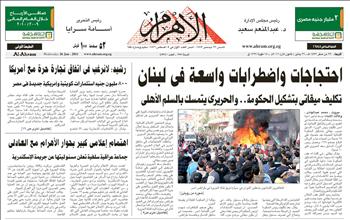
Al-Ahram's front page. Acknowledgement: The Angry Arab
In the absence of any noteworthy events in Egypt, the semi-official al-Ahram newspaper had to look further afield for its main front-page headline yesterday: "Widespread protests and disturbances in Lebanon". This is a classic example of the old-style Arab media sticking its head in the sand.
For real information about what is happening in Egypt, hour by hour, I recommend the Enduring America blog. It includes lots of links to sources, plus photos and videos. Here is yesterday's compilation and here is the start of today's.
So far, mainstream reporting has focused heavily on events in a fairly small area of central Cairo – rightly, to some extent – but there is clearly a lot going on elsewhere. The situation in Suez seems to have turned especially nasty yesterday though details are rather scarce. The video below shows a police station in the city being burned.
On the whole, yesterday's events were less dramatic than on Tuesday, though there were reports of hundreds being arrested and, in many cases, beaten up too. These included a number of foreign journalists (a thoroughly stupid move on the regime's part). Guardian correspondent Jack Shenker recorded an amazing audio report from the back of a police van after his arrest.
Judging from comments on Twitter, the protesters' intention today is to keep the security forces busy, denying them rest before Friday, which is expected to be another big day of street demonstrations.
Mohamed ElBaradei, the reform campaigner, Nobel peace prize winner and holder of the Nile Sash (Egypt's highest honour), is expected to return to Egypt today, and it will be interesting to see what happens when he arrives. In an article for the Daily Beast, Elbaradei says:
The young people of Egypt have lost patience, and what you’ve seen in the streets these last few days has all been organised by them. I have been out of Egypt because that is the only way I can be heard. I have been totally cut off from the local media when I am there. But I am going back to Cairo, and back on to the streets because, really, there is no choice.
Writing on the Arabist blog, Issandr El Amrani notes that president Mubarak has not uttered a word in public about the protests, leaving it to his foreign ministry spokesman to explain that they are being exaggerated by the media (we heard that before in Tunisia) and they prove that Egypt is democratic. I can't say Mubarak's silence surprises me. It took Ben Ali a full 10 days in Tunisia to get round to making a TV broadcast (the one that was interrupted by his phone ringing).
Access to the social media was blocked in Egypt for most of yesterday, though it was later unblocked – apparently as a result of pressure from the United States. The decision to block was a drastic move and probably shows how worried the regime is about Facebook, Twitter, etc. In a way, though, the decision to unblock is more interesting. I can't imagine the regime conceding to a polite American request very readily, and I'd love to know what was said in private. Did the State Department issue some kind of threat and, if so, what was it?
In a press conference yesterday, Hillary Clinton also urged the Egyptian authorities "not to prevent peaceful protests" and said:
"We believe strongly that the Egyptian government has an important opportunity at this moment in time to implement political, economic and social reforms to respond to the legitimate needs and interests of the Egyptian people."
Some will be disappointed that her remarks were not stronger but, for the time being, I think she has got it about right (despite herearlier remarks about Egypt being "stable"). Bush-style stridency from Washington could easily backfire and be used by the regime to discredit the protesters.
Clinton simply spelled out what vast numbers of Egyptians want. I don't suppose for a moment that she thinks Mubarak, as he comes to the end of his 30-year reign, can actually deliver it, but the message was probably addressed – at least in part – to the nervously watching autocrats in other Arab countries and might be translated as: "We've told you what you need to do; if you choose to ignore it that's your problem, not ours."
Protests in Suez yesterday
Posted by Brian Whitaker, 27 Jan 2011.
UPDATE, 27 Jan (evening): The Arabist blog contrastsyesterday's headlines in the Egyptian press with today's headlinesand concludes: "The policy for the state press has changed from ignoring the situation to scaremongering about chaos."

 RSS Feed
RSS Feed
